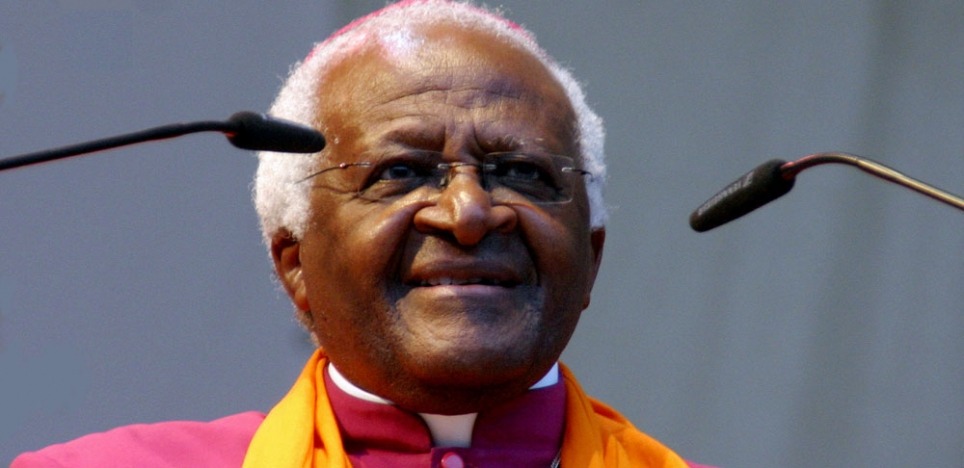Image credit: Desmond Tutu at the Deutscher Evangelischer Kirchentag in Cologne, June 7, 2007. Photo by Elke Wetzig.
Nobel Laureate Desmond Tutu (1931–2021), retired as Archbishop of Cape Town, South Africa, is best known for his work to end apartheid and for his role as Chairman of the Truth and Reconciliation Commission (TRC). Though his vigorous advocacy of social justice once rendered him a controversial figure, today Archbishop Tutu is regarded as an elder world statesman.
Born in Klerksdorp, near Johannesburg, South Africa, in 1931, Tutu initially followed his father's example and obtained teaching qualifications. Following the introduction of Bantu education in 1958, he decided to enter the ministry. He was ordained to the priesthood in Johannesburg three years later. After further theological studies in London, Tutu held several positions in teaching and theological work in South and Southern Africa.
In 1978 he became the new General Secretary of the South African Council of Churches (SACC), a position he held until 1985. Now a national and international figure, he led a formidable crusade in support of justice and racial conciliation in South Africa. In the face of danger, violence, and hatred, he stood up and spoke out against the racist schemes of apartheid. His tireless work was recognized in 1984, when he was awarded with the Nobel Peace Prize.
Tutu was elected Archbishop of Cape Town in 1986, an office he held until his retirement in 1996. In 1995 President Nelson Mandela appointed the Archbishop as Chairman of the Truth and Reconciliation Commission, a body set up to probe gross human rights violations that occurred under apartheid. The TRC operated under the umbrella of restorative rather than retributive justice: Victims of human rights violations were given a chance to tell their stories and to rehabilitate their civil and human dignity. The TRC granted amnesty to those confessing their crimes.
In recent years the Archbishop has turned his attention to a different cause: the campaign against HIV/AIDS. He makes appearances around the globe to raise awareness of the disease and its tragic consequences.
To Name This Day . . .
 Quotes
Quotes
Choose one of these quotes that captures your attention. Reflect in your journal about the relevance today — and in your life — of the values it expresses.
"This award is for mothers, who sit at railway stations to try to eke out an existence, selling potatoes, selling mealies, selling produce. This award is for you, fathers, sitting in a single-sex hostel, separated from your children for 11 months a year. ... This award is for you, mothers in the KTC squatter camp, whose shelters are destroyed callously every day, and who sit on soaking mattresses in the winter rain, holding whimpering babies. ... This award is for you, the 3.5 million of our people who have been uprooted and dumped as if you were rubbish. This award is for you."
— Desmond Tutu's speech on receiving the Nobel Peace Prize
“We in South Africa had the Truth and Reconciliation Commission, and we had the most devastating revelations of ghastly atrocities. We could describe them as monstrous, even demonic. But even these torturers remained children of God, with a possibility of being able to change. After all, a thief on the cross was able to repent and Jesus promised that thief, 'You will be with me in paradise.' Jesus didn't say, 'Look at what kind of life you have led up to this point.' All of us have the capacity to change, even to become saints.”
— in "Desmond Tutu's Recipe for Peace, a Beliefnet interview
"The chief concern of restorative justice is the healing of breaches, redressing of imbalances, the restoration of broken relationships, a seeking to rehabilitate both the victim and the perpetrator."
— Desmond Tutu in Embracing the World by Jane Vennard
"The quality of human life on our planet is nothing more than the sum total of our daily interactions with one another. Each time we help, and each time we harm, we have a dramatic impact on our world. Because we are human, some of our interactions will go wrong, and then we will hurt or be hurt, or both. It is the nature of being human, and it is unavoidable. Forgiveness is the way we set those interactions right. It is the way mend tears in the social fabric. It is the way we stop our human community from unraveling."
— Desmond Tutu and Mpho Tutu in The Book of Forgiving
 Spiritual Practices
Spiritual Practices
"Many of us can acknowledge that God cares about the world," writes Archbishop Tutu in God Has A Dream, "but can't imagine that God would care about you or me individually. But our God marvelously, miraculously cares about each and every one of us. The Bible has this incredible image of you, of me, of all of us, each one, held as something precious, fragile in the palms of God's hands. And that you and I exist only because God is forever blowing God's breath into our being."
It may seem like these words of his concern personal faith rather than Archbishop Tutu's wider work of reconciliation, but to think so would be to miss the roots of reconciliation. We have no basis for forgiving and embracing others unless we know ourselves to be wholly loved and accepted, in a way that no human action or other circumstance can mar.
On behalf of reconciliation and peace spreading far and wide, take a few quiet minutes today to let yourself experience God "forever blowing God's breath" into your being.
